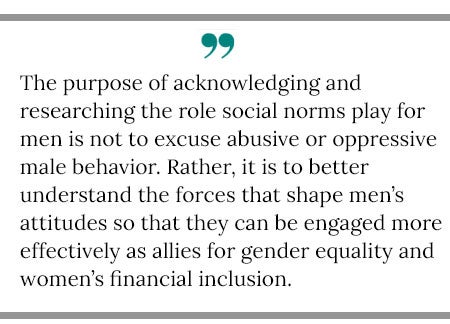How Social Norms for Men Restrict Women’s Financial Inclusion
The financial inclusion community has learned a lot in recent years about the role that social norms play in women’s financial inclusion, but there has been less attention on how social norms affect men and their ability and willingness to support women’s access to financial services. Men often play a gatekeeper-like role in women’s economic and financial lives — for instance, by restricting their wives’ or sisters’ mobility, privacy and access to phones or other assets. Addressing social norms that affect men’s role in society and influence their behavior is an important — but largely overlooked — aspect of advancing women’s financial inclusion.

Social norms are informal, unwritten rules and expectations around how groups of people behave. Gendered social norms, a subset of social norms, prescribe different roles and expectations to men and women. In addition to hindering women’s financial inclusion, these norms often “prescrib[e] men to take risks, not express emotions, be sexually active and aggressive, heterosexual, drink alcohol and not seek help.” Communities often enforce and pass these norms down through the generations through various compliance mechanisms.
Families play an especially big role in imprinting norms of masculinity and unconscious gender biases in boys during early childhood. For instance, CGAP research in Turkey found that mothers often discouraged their sons from sharing house titles with their wives, even when men wanted to share them. Another study in Nepal showed that men who helped women with household duties were looked down upon by both men and their mothers.
As one of the women in the study, Gyanu Giri, said: “If my husband helps me with my work by washing the dishes even my mother-in-law teases him for doing so. Also, the other people look down upon me for the same … The people who want to help hesitate to do so due to the fear of being ridiculed by the village.”
Norms that encourage men to think of themselves as household providers and financial decision-makers, and women to focus on unpaid childcare and household duties, encourage men to restrict women’s financial lives. If a woman involves herself in the family’s financial decisions, grows a business or becomes successful, she may be seen as undermining male authority. A study in Tanzania found that social norms fueled men’s fears that women who seek financial privacy may be hiding something and that successful women may remarry, bringing shame to their ex-husbands. Social norms also influence what has value in the economy and may contribute to gendered occupational segregation, or the idea that there are men’s highly-skilled jobs and women’s unskilled jobs.
This is not to say that all men agree with such norms. Yet even those who do not may lack the confidence to break them or may not even know that breaking them is possible. The fear of being judged as physically and emotionally vulnerable, or having “feminine” traits, may turn men into passive bystanders.

A global study from Promundo found that many fathers avoid caregiving duties for fear of stigma. Similarly, a Plan International Canada's SHOW program observed that men started to develop positive attitudes toward caregiving and household labor only when they saw their peers taking on these tasks. Moreover, an Oxfam We-Care program in Uganda found that couples began to share household responsibilities once they saw tangible results, like increased household welfare.
The purpose of acknowledging and researching the role social norms play for men is not to excuse abusive or oppressive male behavior. Rather, it is to better understand the forces that shape men’s attitudes so that they can be engaged more effectively as allies for gender equality and women’s financial inclusion. At the same time, it is important to recognize that, like women, men are not a homogenous group. Specific groups might have conflicting experiences with power or even be discriminated against, such as those whose gender identity may not be defined in binary terms.
How can social norms restricting women’s financial inclusion be addressed? Context-aware and transformative approaches are required to shift deeply engrained norms about gender affecting both men and women. Such approaches should tackle unequal power relations within households and communities and challenge the attitudes and values around male superiority. For norm transformations to become key drivers for sustainable systemic change, strategies should aim at mobilizing entire communities and engaging all gender groups. To do so, it is important to acknowledge the high costs that gender inequality and women's financial exclusion have in national economies, as well as their negative consequences for communities' resilience and vulnerability.
CARE’s Pathways to Empowerment program offers an example of context-aware and transformative approaches in action. The program facilitates conversations among women and men that question gender-discriminatory norms and practices related to the division of labor, ownership of productive assets and resources, and household decisions. Both men and women have acknowledged that CARE’s gender dialogues have led to positive changes, especially in terms of influencing men’s attitudes and promoting more equal relationships within households. Participants cite improved access to finance as one of the most impactful results, especially access to loans through village savings and loans associations.
To advance equality and women’s rights, especially in the domain of financial inclusion, men have a critical role to play alongside women and women’s rights organizations. As such, more efforts are needed to encourage men to become allies. Addressing social norms limiting women’s access to financial services requires a long-term commitment, but by doing so the global development community can help bring about a more gender-equitable world.
Interested in learning more about gender transformative approaches in financial inclusion or sharing your own work on this topic? Join the conversation with the FinEquity Community on Dgroups and respond to this call for examples of norm aware and norm transformative approaches.




Add new comment